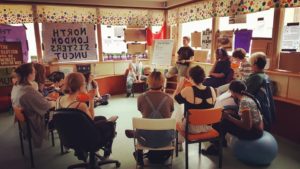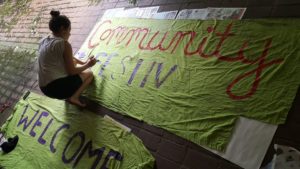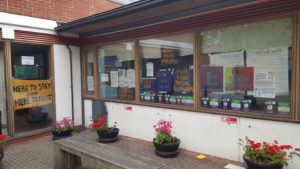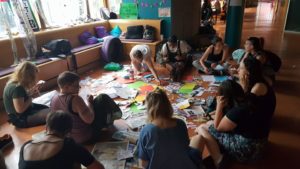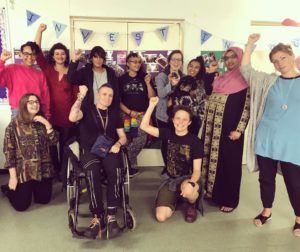NO POLICE IN OUR WOMEN’S BUILDING – Fill out the survey
Friday, June 9, 2023
The Women’s Building* that Peabody has promised to build on the site of Holloway Prison is at risk of housing probationary services.
Formerly the largest women’s prison in Europe, Holloway prison was a site of intense violence and harm. The Women’s Building was demanded by the community, to be a space for healing and support for people who have experienced violence at the hand of the state.
Embedding probationary services into the Women’s Building would be the complete opposite of what the community demanded. We do not want more policing of our communities. We do not want a prison under another name. We want a Women’s Building that works in the interests of us all.
We are asking people to fill out this survey from Peabody to make it clear that we want no probationary services in the Women’s building, that the building should provide specialised services for all survivors and that the building should be for women, non-binary and intersex people, and their children.
Please use our answers below as a guide, but use your own words.
GUIDE ANSWERS
QUESTION ONE
Choose ‘not important’ to the suggestion of ‘Probation referrals’.
Choose ‘other’ and in the text box specify that:
- We need specialist services for Black survivors and survivors of colour, LGBT* survivors (emphasise the need for all services to be fully trans-inclusive), D/disabled survivors, and women, intersex and non-binary people who were formerly incarcerated.
- There should also be a safe injection site/needle exchange.
- No services in the building should be linked to the Criminal Justice System.
- All services should be run by organisations that recognise the harms perpetuated by the Criminal Justice System.
- All services should be free at the point of use.
QUESTION TWO
Choose ‘not important’ for ‘commercial space’.
Choose ‘other’ and note that the space should also:
- Include a kitchen
- Be fully accessible
- Be free at the point of use
Note that there should be no commercial space in the building.
QUESTION FOUR
Choose ‘not relevant’ for ‘exclusive use for women only’ and then clarify in the text box below that it is important that the space is for women (trans and cis), non-binary and intersex people and their children.
Choose ‘other’ and note in the text box that:
- There must be no connection to the Criminal Justice System (including immigration enforcement).
- All services, including childcare, must be offered free at the point of use.
QUESTION FIVE
Strongly state that there must be no probation services in the building. Probation services are an arm of the Criminal Justice System that entrench state surveillance in the lives of formerly incarcerated people and set near impossible standards and codes of behaviour that they must adhere to. Probation services are another way that the Criminal Justice System cements itself in the lives of those currently and formerly imprisoned.
Probation services are not spaces for healing or support.
When the Community came together to demand a Women’s Building, the vision was that it would be a place of healing for those who have experienced violence at the hands of the state. It should work to rectify the pain and trauma inflicted by prisons and the Criminal Justice System. This can only happen if it is completely independent of these systems. No services that are linked to or co-operate with the Criminal Justice System should be housed in the building.
Services provided must not cooperate with the Home Office or Ministry of Justice in any capacity or deny access to individuals on the basis of immigration status.
*’Women’s Building’ is the term used by the Council, Peabody and some community groups. We insist that the building must be inclusive of all women (trans and cis), non-binary and intersex people.
Sisters Uncut statement on the sale of Holloway Prison
Friday, March 8, 2019
After reclaiming Holloway Prison’s Visitor Centre and working with community groups on a new vision for Holloway, we at Sisters Uncut hope that the new owners, Peabody, will listen to our demands and stick to their promises.
In May 2017 we reclaimed Holloway Prison’s Visitor Centre. We transformed a space of state violence, holding a week-long community festival with activities and workshops and demanded that the land continued to be used for public good.
We demanded that the land be used to provide genuinely affordable housing, and host a women’s* building. This building could provide services to all women and non-binary people affected by state violence, especially supporting survivors of colour, LGBTQ and disabled survivors.
New owners, Peabody, reached out to us today. They have promised a minimum 60% affordable housing provision and a Women’s Centre on the old prison site. We are glad to see our demands reflected in Peabody’s statement, and we are keen to enter discussions with them to create a new vision for Holloway which works for the community. We remain sceptical until we see our demands met in practice.
Community demands are all too often forgotten about or diluted beyond recognition in the implementation phase. We will keep on fighting ensure this land is actually used for public good, and not just as good PR for Peabody. One aspect that already gives us concern, is the changing of ‘women’s building’ in our initial demands to ‘women’s centre’ in Peabody’s documents. We will hold Islington Council and Peabody to account over our demands to ensure they are not watered down.
We regret that the sale of this land has helped generate income for the Tories’ plan to build new mega-prisons’, which slash prison budgets while doing nothing to reduce prisoner numbers. Prison and detention are dehumanising, racist, classist, sexist and transphobic. We do not believe that prisons offer a solution to crime. We at Sisters Uncut continue to fight state violence and injustice.
“Abolitionist feminism is a response to the carceral feminism of the past. This project will help to create greater insight, and hopefully more action against the prison industrial complex.”
Angela Davis speaking about the reclamation of Holloway Women’s Prison, 2017
Our demand is that the money made from the sale of the prison be used to fund services in the planned women’s* building. Using money from the sale of the site would be a symbol of recognition and reparation for local survivors of domestic and sexual violence and the women of Holloway Prison.
We hope the new site can act as a remedy for the pain so many women suffered at the hands of state violence.
* ‘Women’s Building’ is the language used by Islington Council. We will fight for a building and services that are available to all non-binary, gender non-conforming people and women and that the name is changed to reflect that.
Images from the week-long community festival we held in the reclaimed visitor’s centre of Holloway Prison.
Why we’ve taken over the underground with poetry on International Women’s Day
Friday, March 8, 2019
Content note: racism, murder, domestic abuse, misogyny
Sisters Uncut stormed the Baftas, occupied a prison for a week and now, on International Women’s Day, has taken over London’s underground with poems.
Why? While the government likes to use this day to present itself as feminist, its policies are criminalising women and non-binary people. The poems on the underground show the stories of women who have found themselves locked up in prison, locked out of refuges, and locked in violent relationships, due to government cuts and hostile environment policies.
The draft Domestic Abuse Bill, which was published this January, seeks to increase arrests and threatens vulnerable women in the process. No woman should be criminalised for calling the police after being abused at home.
Similar policies across the USA have led to an increase in survivors of domestic violence being arrested, especially those from marginalised and oppressed communities. Police investigations can also leave women vulnerable. Testimonies from sector workers and case studies in the media show that survivors are often arrested following interactions with police, despite their partners being the primary aggressors.
The bill lacks substantive engagement with how factors like race, gender identity, sexuality and class shape experiences of domestic violence and access to support. It only pays lip service to migrant survivors and survivors with no recourse to public funds, while failing to mention how the government’s racist immigration policies force many migrant women to remain in life-threatening situations, instead of seeking support.
Insecure immigration status can often itself be a consequence of violence, but under the government’s racist ‘Hostile Environment’ policies, calling the police on an abuser can result in immigration checks, detention and deportation. Recent Freedom of Information Requests reveal that 27 out of 45 police forces across the country share details about the victim’s immigration status to the Home Office – this includes cases of domestic violence. Last summer, Southeast London Sisters Uncut exposed covert immigration officers, who were being embedded in local-authority run domestic violence services in an attempt to catch those with unstable immigration status when they attempted to seek help.
Women with insecure immigration status are cut off from accessing state funds. This means that migrant women can be turned away from domestic violence shelters. A 2017 Women’s Aid study shows that only 7% of women with No Recourse to Public Funds found space in a shelter when escaping from domestic violence.
The government’s cuts to domestic violence services disproportionately target specialist services, making it increasingly hard for migrant and BME survivors to access the support they need. This often leaves migrant women with no way out; the government further cut all legal aid to immigration in 2012, meaning that being in formal employment, opening a bank account and even driving is a crime when undocumented.
This is why the #Stepupmigrantwomen campaign calls for a ‘Firewall’ at the levels of policy and practice, and safe reporting mechanisms: ‘seeking safety should never be more dangerous than staying with a perpetrator’. Reporting domestic violence and other crime and accessing services should be separate from immigration control. This is a matter of life and death.
As anti-carceral feminists, Sisters Uncut believe that the criminal justice system does nothing to protect domestic violence survivors. In the UK, 46% of women in prison are survivors of domestic violence.
A year and a half ago, we occupied Holloway Prison to demand services not sentences. Holloway, the largest women’s prison in western Europe, was closed suddenly in 2016 and the 600 inmates were moved to prisons in rural areas, separated from their support networks. The prison is now standing empty on a 10-acre site of public land. An estate regeneration expert, GVA, is managing the sale of the land. Meanwhile, the money from its sale will go back into building 5 new mega prisons across England.
Holloway has a painful and complicated legacy as a place of criminalisation and state violence against women. The suffragettes were force-fed and labelled terrorists in Holloway, Sarah Reed tragically died in Holloway after being abandoned by the state, while the ‘ringleaders’ of the Yarl’s Wood hunger strikes were imprisoned in the prison. Any future building on this land must reflect and redress this traumatic past. Public land should be used for public good, not to benefit a small elite.
We reclaimed Holloway prison for a week-long community festival to show the government precisely what it could be doing with the land. We took over the space to service the local community and support local women, rather than criminalise them.
A host of local campaigns, including our occupation of the prison, has meant that the site’s planning document now includes reference to a women’s building and ‘affordable housing’. How exactly this will look is yet to be seen — but Sisters Uncut continue to keep our eye on the state and its actions.
In solidarity with the UFFC March: The inquest of Sarah Reed
Saturday, October 28, 2017
CW: Police brutality, sexual violence, state violence, mental health
The United Families and Friends Campaign made their annual memorial procession through the streets of London today, the 28th of October. On this day, and every day, Sisters Uncut stand with UFFC to remember all those who lost their lives at the hands of the state; inside prison cells or detention, in police vans, or simply on their way to the local corner shop.
We understand that many of those frequently affected by police brutality in the UK and globally are black men and other men of colour. It is often our most vulnerable and oppressed men: migrants, those experiencing mental health issues and those with learning disabilities, who are perpetually subjected to racist control and violence by the state. We also want to acknowledge the black and brown women and non-binary people who have been killed while in the custody of the state, whether as a result either of police brutality, abuse and neglect during incarceration or other manifestations of systemic state violence.
Earlier this year, in solidarity with her family, members of Sisters Uncut attended the inquest of Sarah Reed. Sarah, a 32 year-old black, working class woman with mental health support needs, died in Holloway Prison in January 2016 after a long journey of state-inflicted violence. Instead of receiving the mental health support she needed after losing her child, Sarah was subjected to abuse time and time again. The multiple instances of violence perpetrated against Sarah included an assault by an officer of the Metropolitan Police, which led to further deterioration of her mental health due to the trauma, and an attempted rape while she was later detained in a psychiatric unit under the Mental Health Act. When she died, she had been in HMP Holloway on remand for more than three months. The sole purpose of her detention was to obtain two psychiatric reports to confirm whether she was fit to plead for an alleged offence (an incident which occurred when she was defending herself from an abuser) which took place whilst she was an inpatient at a mental health unit.
What we saw during the inquest was, unfortunately, not surprising.On the witness stand we saw a string of psychiatrists (mostly middle-aged, white, middle class cismen) attempting to cover their own backs. They were judgemental, unsympathetic and unashamed. Despite their backtracking and clever side-stepping, the jury found that “Sarah did not receive adequate treatment for her high levels of distress, and the failure of prison psychiatrists to manage Sarah’s medication contributed to her death,” and that “The failure to complete the fitness to plead assessment in a timely manner contributed to her death.”
In fact, the psychiatrists had treated Sarah on the basis of only a diagnosis of a personality disorder, dismissing her history of diagnosis of psychotic disorder including paranoid schizophrenia. Her medication was changed and, of course, she was treated punitively rather than supportively. After one psychiatrist recommended she resume taking anti-psychotic medication, it took the lead psychiatrist 2 weeks before consulting with the team at HMP Holloway. All the while Sarah’s distress was increasing and her mental health was deteriorating fast. She died a few days later.
Importantly, the jury also stated “Sarah’s death was self-inflicted at a time when the balance of her mind was disturbed but [they] were not convinced that she intended to take her life.” Confirmed: She was killed by the state.
One psychiatrist admitted that he concluded his “assessment” after merely looking through the hatch in Sarah’s cell door for a couple of seconds, not even having stepped into to room or engaged her in conversation. “But you can tell a lot from observation,” was the gist of his lengthy defence.
It was also appalling to see the judge himself make a snide remark about Sarah, after her support worker had mentioned her missing a couple of doctor’s appointments. “Not very good at keeping appointments, is she?” Well, just maybe that’s one of the things someone with mental health support needs might need help with. And maybe, as a judge, you could leave your disablist attitudes at home. In that room, it became clearer than ever that as a black working class woman, Sarah Reed had the odds stacked against her at every point of her engagement with the state. We could see not a single witness who would be able to even begin to relate to her lived experience on a personal level.
Today, we march for Sarah Reed. We stand in solidarity with her family and all of the families affected by police brutality and deaths in state custody. We will continue to fight with them and to expose the systemic oppression and violence inflicted upon our sisters, brothers and siblings by the police, prisons and mental health services.
Click here to find out how you can support the United Friends and Families Campaign.
Details or the jury’s findings during the Inquest can be found here: Inquest.org.uk
In Solidarity with Reclaim Holloway
Friday, November 11, 2016
In July, HM Prison Holloway shut its doors. The women who lived there were forced out of London; away from their communities, families and support networks. The 8 acre site is now being prepared for sale. Tomorrow, Saturday 12th November, Sisters Uncut will join Reclaim Holloway to demand that this land is used for the benefit of the people of Holloway and the women who had been imprisoned there.
In March, we showed our anger outside Holloway after the tragic death of Sarah Reed inside its walls. Beaten by the police, denied access to medication, imprisoned for protecting herself from sexual assault – Sarah was the victim of state-sanctioned violence. When she was found dead in her cell on 2nd January, the complicity of our criminal justice system in Sarah’s death was laid bare.
Tomorrow evening we will again reclaim this place of violence, and remind our decision-makers that this valuable site is public land, and must be used for public good.
Six hundred women were moved out of Holloway and into inhumane conditions in prisons outside of London. They were deprived of adequate food and medical care, many completely cut off from support services in London. Loved ones, including children, who cannot afford a trip outside the city, will no longer be able to visit. Two-thirds of imprisoned women are mothers of children under the age of 18.
The site of the prison has an estimated value of over £250 million, and there are plans to develop it into luxury apartments. This is unacceptable. The people of Holloway, and the women who lived there, need this land for themselves. Women and ex-offenders in North East London do not have access to specialist services and support. There are only 27 refuge spaces in Islington borough; survivors need spaces to heal and seek safety from domestic violence. They do not need to be priced out of their own communities by the inevitable rent increases caused by a luxury development.
Our prison system perpetuates violence against women, particularly those who are most vulnerable. 46% of women in prison are survivors of domestic violence, and more than 53% were abused as children. 30% of women in prison self-harm, and 19 in England and Wales have died in prison this year alone. Our black, brown, migrant and working class sisters are imprisoned at disproportionately higher rates, and our transgender sisters are forced into men’s prisons where they must fear for their lives. Prisons are misogynistic, racist, classist and transphobic.
Our government wants to close Britain’s old Victorian prisons and build 9 new “super-prisons” better equipped for an age of mass incarceration. It is now more than ever that we need to seriously think about alternatives to imprisonment. Prisons are violent. Prisons kill. Women and non-binary people need to be supported, not isolated. The site of Holloway prison needs to meet the needs of its community, not destroy it.
Support Reclaim Holloway:
- Join us at the protest outisde Holloway Prison tomorrow at 5pm
- Sign the petition to use the Holloway site for the good of the community
- Write to your MP using Reclaim Holloway’s template
- Follow Reclaim Holloway on Twitter

